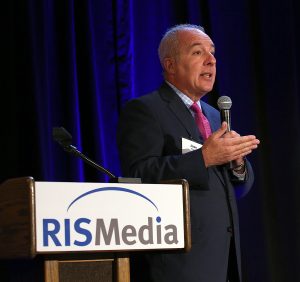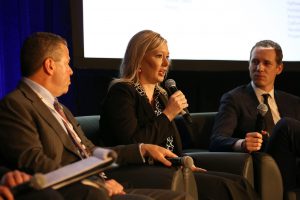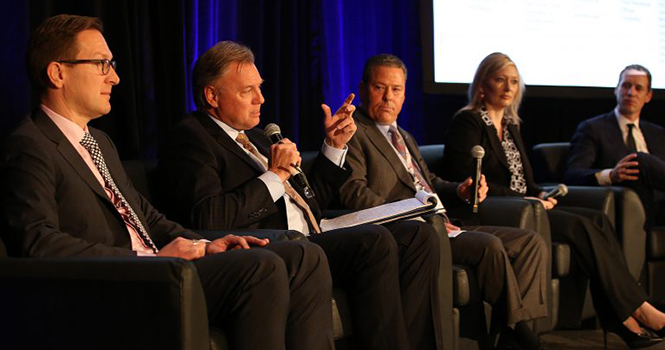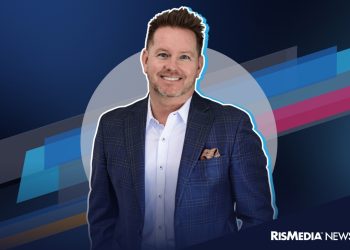Editor’s Note: This was originally published on RISMedia’s blog, Housecall. See what else is cookin’ now at blog.rismedia.com:
- Brighter, Faster—but Not Stronger? Breaking Down the iPhone 8
- Florida Waterfront Home in Kings Bay
- Infographic: Easing the Burden of Student Loan Debt
“There are a lot of different models in this room. At the end of the day, you have to be true to your model, just like Nordstroms, WalMart and Macy’s. It’s the same thing here.”
And with those wise words, Jose Perez, executive vice president of Global Sales for Proxio, set the tone for the panel discussion he moderated at RISMedia’s Real Estate CEO Exchange: “The Evolution of The Real Estate Model: Are You Adapting Fast Enough?” Gathering together industry leaders representing a variety of real estate business models, the session sought to answer the questions “Is there room for many models in this industry?” and “Is one necessarily better than any other?” The short answer: Any model can work, as long as it’s well understood and well executed.
Understanding Your Model
Changing market dynamics and changing consumer demands have paved the way for many variations on the traditional real estate model. Here’s a look at how the panelists described their models:

Rob Lehman, Chief Revenue Officer, Compass
“We’re a technology powered brokerage first and foremost. We’re 100-percent focused on building software for agents and creating value for agents. We bring people in from outside (i.e., Pixar and Google) who have never worked in real estate because we want phenomenal expertise.”
Ashley Bowers, Chief Operating Officer, HomeSmart
“We play in the middle—we’re a hybrid. We’re not a discounter. We are delivering high service and charging a full fee to the consumer, and we have the brick and mortar; but we are charging a flat fee to the agent because of our centralized services.”
Mark Stark, CEO and Owner/Broker Berkshire Hathaway HomeServices Arizona/California/Nevada Properties
“We transformed our company from a traditional brokerage to a business services company. We help agents grow a brokerage under the umbrella of the company. There are two important things about us: We know who we are, and we know who we are not.”
Richard “Rick” Haase, President, Latter & Blum, Inc.
“We’re a 100-year-old company founded in New Orleans. We run a house of brands you’d all define as traditional model. In Houston, we have a model that is the polar opposite. Agents there pay an annual fee and a small transaction fee to do business. In New Orleans, we have 1,400 agents and 140 employees. In Houston, we have 1,840 agents and nine employees. It’s a different company when you cross that state line.”
Errol Samuelson, Chief Industry Development Officer, Zillow Group
“A big chunk of our engineering is working on the consumer experience; it’s also about building software for real estate brokers and agents. Of late, we’re building out solutions for brokers with Premier Brokers. Our belief is to move fast and big and this goes to the core of why we ruffle feathers, but it’s what drives our success. We’re constantly pushing ourselves to try new things. At times, we stub our toe.”
Knowing Your ‘Why’
As Perez noted, no matter what your model, knowing your reason for being is essential to your success. Therefore, he asked panelists, “What’s your ‘why’?”

Bowers: “Our ‘why’ is making real estate easy. That is the foundation Matt (Widdows, HomeSmart CEO and founder) started the company on. Are we making it easier for the consumer? For the agent? For the broker? Everything we do as a company has to answer that question. And if we can’t answer ‘yes,’ we don’t move forward on it.”
Lehman: “We are a mission-driven company, and that mission is to help everyone find their place in the world. We move people into homes, and speaking specifically to the real estate agent, we’re helping them find their place in an extremely rapidly changing environment.”
Stark: “How can we help one individual improve their life? Our model is built around a brokerage within a brokerage and that’s whether it’s a brokerage of 25 or a brokerage of one. We will not argue with the truth—every time you argue with the truth, you lose 100 percent of the time.”
Haase: “We skated to where the puck was going. If this is where the puck is going, we want to go to school on it and understand it really well before it reaches a tipping point. There’s more than one way to run a railroad. The question is, are we moving fast enough?”
Samuelson: “When the company started, it was all about doing research into finding out what the consumer wants and building an experience that really delights consumers.”
Keeping Your Model in Motion
Of course any good business model is only as good as its ability to evolve. Panelists closed the session with thoughts on keeping their respective firms ready and able to adapt for the future.
Bowers: “Information is going to be more prevalent on the sales side of the transaction for the seller. We’re working with new lifecycle models for brokers, agents and consumers.”
Lehman: “It comes down to how do you create value to the agent? Do you grow your business when you come to Compass? That’s the simplest way to cut through everything.”
Samuelson: “Millennials are delaying entry to homeownership. But when they’re interested, they’re amazing customers. They engage sooner and transact sooner. Fifty-five percent will recommend to family and friends and 40 percent of millennials actually stayed in touch with the agent.”
Stark: “Every year is a process of growth—I wouldn’t want the Mark Stark of 10 years ago running the company today. Once a year we buy our company. We ask ourselves, ‘What were they doing right, what were they doing wrong, what would we revamp?’ Every year we improve and save money.”
Stark’s concluding thoughts provided a fitting summation to the discussion surrounding new business models.
“I don’t see any one model that has every single piece to win overall, especially in a changing environment. What are all the ingredients you need to succeed? That will change over time.”
Stay tuned to RISMedia for continuing coverage of this year’s CEO Exchange sessions:
- The State of Real Estate: ‘The Good, the Bad and the Ugly’
- Brokers Get Real About Standards, Succession Planning and Zillow
- Ushering in a Fresh Perspective: John Peyton and Nick Bailey Ready to ‘Blow the Dust off’ Iconic Brand
- Photo Recap: RISMedia’s 2017 Real Estate CEO Exchange
- Innovation, Not Irrelevancy: 3 Strategies to Sustain
- Big Data, Big Opportunities: How Predictive Analytics Is Changing the Business of Real Estate
- Are You Prepared to Handle the Top 3 Risks to Your Brokerage? (Do You Even Know What They Are?)
- Avoid ‘Chickeducks’: Team Leaders Talk Lessons Learned
- Tackling Disruption From the Inside Out
Maria Patterson is RISMedia’s executive editor. Email her your real estate news ideas at maria@rismedia.com.
For the latest real estate news and trends, bookmark RISMedia.com.












